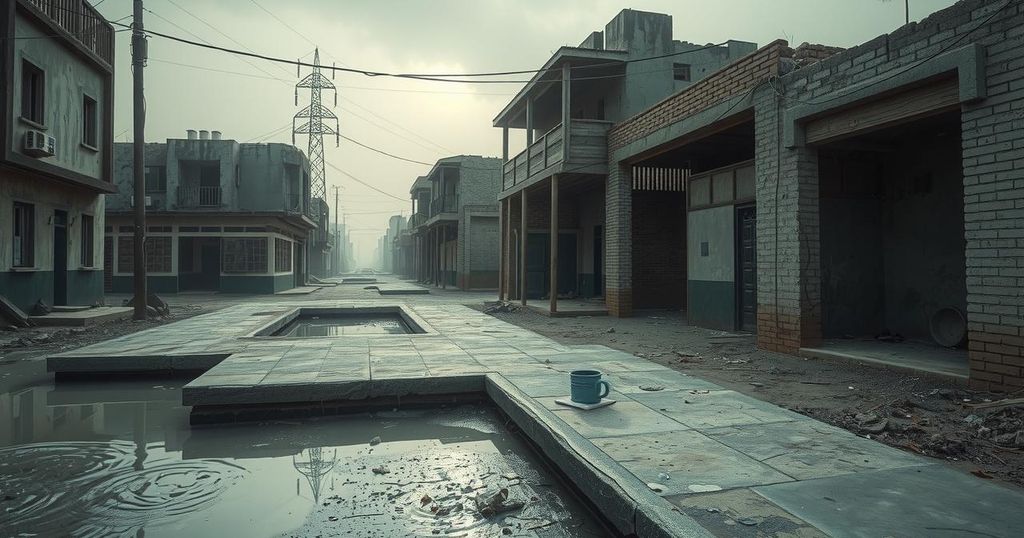Cholera Outbreak in Sudan Claims Over 170 Lives Amid Humanitarian Crisis

A cholera outbreak in Sudan has killed 172 people and sickened over 2,500 in just a week. Sparked by conflicts and poor sanitation, health workers are overwhelmed as infrastructure collapses. The situation is dire with ongoing violence hindering effective health responses, bringing additional diseases to the forefront.
CAIRO — A rapidly spreading cholera outbreak in Sudan is causing grave concern, with reports confirming 172 deaths so far. Over 2,500 individuals have fallen ill recently, primarily around the capital, Khartoum, and its neighboring city, Omdurman. Fleeing the ongoing civil war, many returning residents face a lack of clean water, which is notoriously linked to the transmission of cholera as much of the local health infrastructure has collapsed due to the ongoing conflict.
The Sudanese Health Ministry reports a shocking increase in cholera cases—rising from about 90 a day to 815 between May 15 to May 25. Since January, more than 7,700 cases have been confirmed, affecting thousands, including over 1,000 children under the age of four. While most cases are centered in Khartoum and Omdurman, cholera has also been detected in five other provinces, prompting urgent health responses.
Joyce Bakker, Sudan coordinator for Doctors Without Borders, revealed that their treatment centers are inundated with patients. “Scenes are disturbing,” she stated, noting that many arrive too late for effective care. The true extent of the outbreak remains unclear, with healthcare teams only seeing a fraction of infections.
Rising from the devastation of the civil war, the outbreak’s spread can be linked to the mass return of residents to Khartoum, a city that has suffered immense damage. Following military recapture of the area from paramilitary forces in March, around 34,000 people returned but found their homes damaged and essential services like clean water scarce. Attacks on infrastructure have left many without access to hygiene.
Dr. Rania Elsayegh from Sudan’s Doctors for Human Rights emphasized that contaminated water and unsanitary conditions are to blame. “People have been drinking polluted water,” she noted, alerting to the increased risk of rapid disease spread within crowded displacement centers. Furthermore, over 80% of hospitals in the region are reportedly non-operational, compounding the crisis as remaining facilities struggle with shortages in medicine and water.
Cholera, characterized by diarrhea caused by the bacterium Vibrio cholerae, is labeled a “disease of poverty” by the World Health Organization due to its relationship with poor sanitation and lack of clean drinking water. It’s usually treatable with rehydration solutions and antibiotics. Still, in severe cases, it can lead to death within hours if untreated, which is alarming given the WHO’s dwindling vaccine stockpile.
Sudan’s civil unrest, which has been ongoing since April 2023, has significantly contributed to this outbreak. With at least 24,000 confirmed deaths attributed to the conflict and over 14 million people displaced, conditions have worsened alarmingly. The violence includes war crimes and exacerbates the ongoing humanitarian crisis, with famine declared in various locations.
Past cholera outbreaks are not unusual in Sudan. In 2017, there were at least 700 fatalities and many thousands sickened within the span of a couple months. The current war facilitates repeated outbreaks, with one instance last October affecting over 20,000 people and resulting in at least 626 deaths, according to health officials. The outbreak earlier this year saw over 2,600 people infected.
In addition to cholera, the public health crisis is broadening with other illnesses making their rounds. Recent reports indicate an ongoing dengue fever outbreak, with around 12,900 cases, alongside at least 12 fatalities from meningitis. The convergence of these health threats underscores the urgent need for medical support in the region.
The cholera outbreak in Sudan is a stark reflection of the country’s prolonged civil conflict and deteriorating health infrastructure. With thousands already affected and reports of other diseases emerging, prompt action is crucial to manage the situation. The reality of widespread poverty and lack of access to clean water makes combating cholera and related health crises incredibly challenging in Sudan. The situation is dire, highlighting the urgent humanitarian need in the region.
Original Source: www.newsday.com







